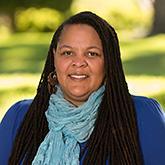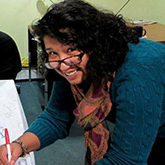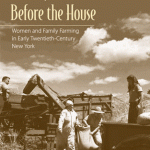Catherine Prelinger Award
PLEASE VISIT OUR NEW AWARDS PAGE FOR CURRENT AWARD INFORMATION
The CCWH Catherine Prelinger Award is a scholarship of $20,000 which will be awarded to a scholar of excellence. This award, named for Catherine Prelinger, a former CCWH president and nontraditional scholar, is intended to enhance the work of a contemporary scholar whose academic path has not followed the traditional path of uninterrupted study, moving from completed secondary, to undergraduate, then graduate degrees, followed by a tenure-track faculty position.
These funds were originally granted to CCWH by an anonymous donor in honor of the many years of work this organization has devoted to exploring women’s history, encouraging opportunities for women in the historical profession, and in educating young women to pursue careers in the historical profession. This award is intended to enhance the ability of the recipient to carry on these CCWH traditions through contributions to women in history, either through scholarly or professional activity.
Eligible applicants must be members of CCWH and must hold either A.B.D. status or the Ph.D. at the time of application. They shall be actively engaged in scholarship that is historical in nature, although the degree may be in related fields. Applicants will show evidence of a nontraditional professional career and describe a project that will further enhance women’s roles in history. They should also demonstrate their contributions to women in the historical profession and/or service on behalf of women. The Prelinger Committee encourages applications from independent and non-academic scholars.
Committee email: PrelingerAward@theccwh.org
2022
Heather Butina-Sutton, “Hucksters, Hawkers, and Ganhadeiras: How Black Women Shaped Culture and Capitalism in the Atlantic World, 1780-1888.”
Honorable Mention: Katie Von Wald, “Chasing Auras: The Afterlives of 19th Century Hysterical Pathologies on Feminine Subjects and Unruly Queer Futures”
2021
Michelle Daniel Jones, “Creative Liberation Strategies in Prison: The Alabama Arts and Education Project.”
2020
Aimee Loiselle, “Creating Norma Rae: Southern Labor Activists and Puerto Rican Needleworkers Lost in Reagan’s America.”
Honorable Mention: Renae Sullivan, “Marital Educator or Development Envoy: Transnational Home Scientists in India, 1949-1972.”
2019
Jessica Waggoner, “Crip Activisms: Race, Gender, and the Roots of Disability Consciousness, 1900-1950.”
Honorable Mention: Heidi Feldman, “Black, Woman, and Latin American: Rhythm and Mobility in the International Career of Victoria Santa Cruz.”
2018
Lora Michelle Key, “We’re All Americans Now: How Mexican American Identity, Culture, and Gender: Forged Civil Rights in World War II and Beyond.”
Lora Key is a Ph.D. candidate in the Department of History at the University of Arizona. Ms. Key’s application dossier, particularly the evidence of her commitment to serving women inside and outside of academia, is impressive. The committee found Ms. Key’s dissertation project fascinating, and a highly original and timely work that illuminates the lesser known voices, oral narratives, and experiences of individuals who are often neglected by historians. In her project, “We’re All Americans Now: How Mexican American Identity, Culture, and Gender Forged Civil Rights in World War II and Beyond,” Ms. Key examines Mexican American women’s participation on the WWII home front and subsequent civil rights activism. Building on the work of scholars like Leisa D. Meyer, Heather Marie Stur, and Elizabeth Escobedo, her study demonstrates how U.S. Latina women’s wartime involvement shaped ideas about gender and sexuality in the twentieth century. A major contribution to the fields of United States history, particularly in the urban Southwest, and Mexican American Women’s studies, Ms. Key’s dissertation will add to contemporary conversations about the intersections between gender, ethnic identity, and political activism.
Ms. Key has overcome adversity at multiple moments in her personal and scholarly career, yet she has transformed those experiences into intellectual and social engagement that is truly remarkable. A non-traditional Hispanic student and Air Force veteran, Ms. Key is a promising scholar who combines a passion for U.S. Latino/a History with a strong commitment to social justice and communication. In addition to completing her dissertation and teaching courses, she has been a leader among her peers, serving twice as President of the Graduate History Association. Significantly, Ms. Key is a dedicated single mother and daughter, serving as primary caregiver for her elderly mother throughout her academic journey. The Prelinger Award committee has no doubt that this award will not only promote Ms. Key’s research within the scholarly community, but will also provide her the support necessary to bring her work to the broader national and international public at an integral political moment.
Honorable Mentions
- JoAnn LoSavio, Northern Illinois University
“Modern Mandala: A Comparative Transnational History of Southeast Asian Women from Burma, Malaya and Thailand in Great Britain and the United States, 1950-1970.” - Ozlem Ezer, Independent Scholar
“Syrian Women in Transition in the Global North After 2011: An Oral History Project Regarding the Black W/Hole of a Major Humanitarian Crisis”
2017
 Charlene Fletcher
Charlene Fletcher
Dissertation: “Confined Femininity: Race, Gender, and Incarceration in Kentucky, 1865-1920.”
Charlene J. Fletcher is a Ph.D. candidate at Indiana University, Bloomington and an editorial assistant at the American Historical Review (AHR). Her research interests include 19th and early 20th century U.S. history, with a focus on intersections of race, crime, and gender. Charlene’s current research explores the experiences of confined African-American women in Kentucky from Reconstruction to the Progressive Era, specifically illuminating the lives of confined black women by examining places other than carceral locales as arenas of confinement, including mental health asylums and domestic spaces. Charlene seeks to explore how these women both defied and defined confinement through their incarceration, interactions with public, social and political entities of the period, as well as how they challenged Victorian ideas of race and femininity and shaped prison and political reform in Kentucky.
Charlene attended Howard University, but completed her undergraduate degree in Criminal Justice at the age of 26 at Martin University in Indianapolis. She holds master’s degrees in Criminal Justice and History from John Jay College and Brooklyn College, respectively. Prior to attending IU, Charlene led a large prisoner reentry initiative in New York City, assisting women and men in their transition from incarceration to society. She also served as a lecturer of criminal justice at LaGuardia Community College. Charlene’s work is motivated by her personal and professional experiences — particularly her work with individuals and families impacted by incarceration — and these experiences continue to fuel her passion for her work today.
Honorable Mentions
- Inez Talamantes
- Heather Sinclair
2016
 Frances Reanae McNeal
Frances Reanae McNeal
Dissertation “African Native American Women’s Rhetorics of Survivance: Decolonization and Social Transformation”
Ms. McNeal is a Ph.D. candidate in Multicultural Women’s and Gender Studies with a concentration in English and Cultural Rhetorics at Texas Women’s University. She is completing a digital dissertation and multimedia research projects that convey the herstories of African Native American women’s rhetorics of survivance (survival and resistance).
African Native American women (also known as Black Indians) who are of both African American and American Indian ancestry suffer immense human rights violations. They often speak of “pencil genocide,” which included an historic pattern of changing government documents to erase Black Indians’ dual identities. This pencil genocide has often lead to detribalization, erasure, and their identities being suspect (often making them insiders/outsiders in both African American and American Indian communities). Because of these violations, their (her)stories and epistemologies are often erased and overlooked in dominant knowledge systems. The importance of Ms. McNeal’s research is that she centralizes their (her)stories, grounded in rhetorics of survivance, while highlighting women from multiple Indigenous nations such as the Choctaw, Seminole, Creek, and Blackfoot and diverse African American communities. As a result, her research challenges dominant narratives and settler colonial paradigms while underscoring the sovereignty of the women. Practicing rhetorics of survivance and African Native American women’s storytelling methods, she incorporates their stories, generational wisdom systems, and images across generations to reveal their powerful (her)stories. Simultaneously, her research includes the interrelated (her)stories of both African American and Native women.
Ms. McNeal’s life experiences and journey to her Ph.D. motivated her to bring diverse worldviews and enact decolonial paradigms in her scholarly work and classrooms. She completed her B.A. in Liberal Arts with a concentration in Political Science and African American Studies at Western Illinois University. Then, after some time, she went on to complete her M.A. in Women’s Studies and M.A. in English at Texas Woman’s University. Ms. McNeal writes that she remains “thankful to [her] grandmothers who kept telling the (her)stories of our women ancestors and the ways they survived and resisted genocide, colonialism, enslavement, patriarchy, gender violence, and marginalization.”
Honorable Mentions
- Courtney Campbell
- Lara Freidenfelds
- Lily Anne Welty Tamai
2015
 Annette Marie Rodríguez
Annette Marie Rodríguez
Dissertation “The Lynching of Mexicans in the United States: Making Visible U.S. Terrorscapes”
Ms. Rodríguez is a Ph.D. candidate in American Studies at Brown University who is completing her dissertation on the lynching of Mexicans in the United States in the period 1850-1920. Her work centers the place of women in masculinist histories of violence as she explores the import of public violences in communicating events that have reinforced and reconstructed ideologies and hierarchies of gender, race, citizenship, and national belonging. Her work is both current and compelling. Not only does she incorporate a much-needed history of violence against Mexicans into our troubled narratives of lynching, she also explores linkages between this history and current campaigns of violence.
Ms. Rodríguez’s path to the Ph.D. has been circuitous, yet has made her finely attuned and committed to the needs of underserved youth and women particularly. Annette dropped out of her New Mexican high school her junior year. She later obtained her GED and finally returned to school to complete her B.A., followed by an M.A. in American Studies, when she was in her 30s. Ms. Rodríguez is an adjunct history teacher in Santa Fe Community College and is dedicated to teaching underserved youth. She writes that she “works to ignite a passion for history in my students who, like myself [in her youth], may find themselves bored, disengaged, disenfranchised.”
2014
 Waaseyaa’sin Christine Sy
Waaseyaa’sin Christine Sy
Waaseyaa’sin Christine Sy is a completing a Pre-Doctoral Dissertation Fellowship in American Indian Studies at Michigan State University. She is a Ph.D. Candidate in Indigenous Studies at Trent University in Ontario, Canada. The award will allow her to complete her dissertation, “Following the Trees Home: Anishinaabe Women at the Sugar Bush.”
In the Great Lakes region, traditional stories, oral histories, settler observances, and Native American Women’s history indicate Anishinaabeg women carried out the work of harvesting sap, boiling it down, and sugaring it off into maple sugar. In her dissertation, “Following the Trees Home: Anishinaabe Ikawewag Iyaawag Iskigamiziganing (Anishinaabe Women at the Boiling Place),” Christine reclaims historical and Anishinaabe knowledge of relationship(s) with the sugar bush to theorize Anishinaabeg women’s power and illuminate its shifts through more modern periods of Anishinaabeg history including the fur trade, settler colonialism, and industrial development. As a disruption of the dominating heteropatriarchal, paternal, and capitalist structures that shape the realities contemporary Anishinaabe women navigate, this historically based research affirms sovereignty for Anishinaabeg women and their communities despite on-going economic marginalization and neo-colonial violence. Christine utilizes insights from Indigenous methodologies and is informed by preexisting scholarship in Indigenous, Aboriginal and Native American Women’s History. Primary and secondary sources about specific Anishinaabeg women who worked the sugar bush and/or were affiliated with its trade between the late 18th century and late 19th century are central to the research. She draws on Anishinaabe language, traditional stories, oral histories and conversations with Anishinaabe knowledge practitioners and thinkers about their present and past experiences working the sugar bush.
The Catherine Prelinger Award will support Christine’s research to defense, anticipated summer 2015, and thereafter it’s transformation into a manuscript.
Christine is Anishinaabe of mixed ancestry and is a language and land learner; writer; activist; and educator in Indigenous history, women and gender, literature and Anishinaabeg Studies.
2013

Donna Sinclair
Donna Sinclair is a Ph.D. candidate in Urban Studies at Portland State University (PSU) and has worked as a public and oral historian since the late 1990s. She now teaches U.S. History, diversity courses, and Public History as an adjunct instructor at Washington State University Vancouver and at PSU.
The Prelinger Award will allow her to complete her dissertation, “Multicultural Mandates: Transforming the U.S.D.A. Forest Service in the Civil Rights Era.” Sinclair’s dissertation project examines the extension and limitations of liberal democratic rights within a bounded historical context that connects environmental and social history with policy, individual decision making, gender, race, and class in American history. It documents major shifts in a homogeneous patriarchal organization, constraints placed upon women and minorities, and identifies tools for change. It tells a story of expanding and contracting civil liberties that shift from women and people of color to include the differently-abled and LGBT communities. It includes oral history as a tool for empowerment and a key to uncovering individual narratives that help to explain historical institutional change. With gender and race as primary categories, this inquiry shapes an historical narrative that is evocative, meaningful, and critical to understanding federal bureaucratic efforts to meet workforce diversity goals.
This project began with a service learning partnership between the Forest Service and PSU in 2004. Under Sinclair’s direction, students collected more than 30 interviews with diverse employees and leaders. The stories that emerged involved race and class based systems of the sharecropping South, the agricultural fields of the Southwest, rural and urban Western and Eastern communities, and serendipitous connections to government programs that have shaped lives. These and dozens of other interviews collected by Sinclair with agency leaders and employees at the national level ground a history that also draws from government and agency reports and archival materials. Additionally, and perhaps most importantly, by placing women and people of color at the center, rather than the periphery, this project opens new windows to understanding the role of women and minorities in shaping historical institutional and social change.
Sinclair graduated from high school in 1982 and obtained an Associate’s degree in 1992. As a single parent of three, she then completed a B.S. in Social Sciences in 1996 and a Master’s of History in 2004. She is slated to complete her Ph.D. in Urban Studies in Fall 2014.
2012

Julie R. Enszer
Julie R. Enszer is a professor in the Department of Women’s Studies at the University of Maryland. Her dissertation, described below, received the Catherine Prelinger Award.
THE WHOLE NAKED TRUTH OF OUR LIVES: Lesbian Print Culture in the United States from 1969-1989 – During the 1970s and the 1980s, lesbian-feminists created a vibrant lesbian print culture, participating in the creation, production, and distribution of books, chapbooks, journals, newspapers, and other printed materials. This extraordinary output of creative material provides a rich archive for new insights about the Women’s Liberation Movement (WLM), gay liberation (the LGBT movement), and recent U.S. social history. In my dissertation, The Whole Naked Truth of Our Lives, I construct and analyze historical narratives of lesbian-feminist publishers in the United States between 1969 and 1989. Interdisciplinary in its conception, design, and execution, The Whole Naked Truth of Our Lives is the only sustained examination of lesbian print culture during the 1970s and 1980s; it extends the work of Simone Murray on feminist print culture in the United Kingdom as well as the work of literary scholars Kim Whitehead, Kate Adams, Trysh Travis, Bonnie Zimmerman, and Martha Vicinus, and historians Martin Meeker, Marcia Gallo, Rodger Streitmatter, Abe Peck, John McMillian, and Peter Richardson. From archival material, including correspondence, publishing ephemera such as flyers and catalogues, meeting notes, oral history interviews, and published books, I assemble a history of lesbian-feminist publishing that challenges fundamental ideas about the WLM, gay liberation, and U.S. social history as well as remapping the contours of current historical and literary narratives.
2011
LaShonda Mims
La Shonda Mims received the 2011 Prelinger award as a PhD candidate in history at the University of Georgia. She defended her dissertation, Drastic Dykes and Accidental Activists: Lesbians, Identity, and the New South, in the summer of 2012 because of this generous award.
Her research explores the individual lives of women who sought the intimate company of other women, and the cultural, gendered, political, and racialized institutions that often defined these relationships. She argues that the cities of Charlotte, North Carolina, and Atlanta, Georgia, share an important place in New South history as sites of urban connection and identity formation for lesbians. By taking apart the familiar concepts of southern femininity, the southern belle, and genteel sexuality her work upends historical narratives of southern women, and reframes them in a feminist, sexual, activist, and social light.
Mims entered the University of Georgia in 2006 as a nontraditional student both in age and circumstance. Neither of her parents completed a college degree, none of her grandparents graduated from high school, and she is the first in her family to pursue a graduate education. She completed her BA in history in 1992 and then worked in public history, supplementing her income with additional part-time positions. After receiving her MA in history in 2003, Mims worked as an adjunct instructor and continued to work on public history projects until she was able to return to graduate school.
2010

Stephanie Moore
Stephanie Moore received the 2010 Prelinger Award to conduct additional research for her manuscript-in-progress, Dangerous Races: “Yellow Peril” in Latin America, and to make such research accessible to Nikkei communities. Dangerous Races is one of the first studies to analyze how Latin American perceptions of Japanese women played into the anti-Japanese policies that culminated in the deportation of approximately 2,200 Japanese Latin Americans to internment camps in the United States during World War II. With the Prelinger Award, Moore expanded her research on how the Latin American eugenics movement contributed to a hyperfocus on Japanese women’s sexuality and reproduction that both resonated in Peruvian culture and translated into policies restricting the immigration and activities of Japanese Peruvians. Not only does such a study fill a void in the literature and community discussion on the history of Asian women in Latin America, it also demonstrates the centrality of women’s sexuality, together with race, in the eugenics-inspired immigration policies of the twentieth century.
In addition to multiple academic forums, Moore has presented her Dangerous Races research at the Japanese American National Museum (Los Angeles), the Chicago Japanese American Historical Society, and the Japanese Peruvian Oral History Project (JPOHP/San Francisco Bay Area). Moore has published on gender and Japanese Peruvian immigrants (http://escholarship.ucop.edu/uc/item/0g06x8z0) and, in Spanish, on the reparations campaign (http://www.discovernikkei.org/en/journal/2007/12/4/nikkei-internados/). With the support of the Prelinger Award, Moore published “Peruvian Indigenismo, Race, and Asian Peruvians, 1900-1930″ in the social history journal A Contracorriente (May 2014).The Spanish-language article highlights the contributions of Dora Mayer, a Peruvian indigenous advocate, to the debates on race and nation during the first decades of the twentieth century (http://acontracorriente.chass.ncsu.edu/index.php/acontracorriente/article/view/844/1509).
2009
Dr. Grey Osterudis is an independent scholar and used the Prelinger Award to complete her book, Putting the Barn Before the House: The Lives of Rural Women in Twentieth Century New York (Cornell University Press, 2012). Her first book, Bonds of Community: The Lives of Farm Women in Nineteenth-Century New York, was published by Cornell University Press in 1991. As a graduate student in the interdisciplinary in American Civilization at Brown, where she received her Ph.D. in 1984, Osterud went to the U.K. on a Fulbright to study working-class women during the process of capitalist industrialization in Leicester, England. At that time she participated in the founding of Gender and History.
Her current work explores twentieth century rural women’s perspectives on the prevalent notion that women in farm families were to subordinate their individual inclinations to “the good of the farm.” Most of these rural women in 20th century New York saw investing capital and labor in productive operations rather than spending money on consumer goods or devoting time to leisure activities or mere housework- as a necessary and rational course for families who are determined to make a living on the land and, if possible, to pass on viable farms to their children.
She worked in public history while teaching in Oregon and California. When Gender and History needed a American co-editor, Osterud resigned from her tenured position and worked half-time for the journal. After her term as co-editor expired, she became a freelance developmental editor working with authors on books in American women’s and gender history, African American history and social history.
2008
Midori Green
Ms. Green is a PhD candidate at the University of Minnesota to complete her dissertation on, “Sec’s Appeal: The Secretary in American Popular Culture, 1900-1964.” Her dissertation examines the visual and material world that female clerical workers interacted with on a daily basis,” from sexy secretaries depicted in advertising, films, and cartoons, to the new work, leisure, and living spaces in the modern city. “With this in focus, she explores the ways images, she explores the ways images, objects, and environments were instrumental in shaping a new identity for women in the 20th century, that of working middle-class women. She also considers the ways the material world became instrumental in either advancing or deterring women’s success in the workplace.
The award committee was particularly impressed in Green’s interest in women’s workplace culture and believed that this study will show how these working women impacted—both culturally and physically—on office culture, the shaping of new urban spaces and redefinition of “middle-class.”
2007
Ann Marie Wilson
Ann Marie Wilson is a PhD candidate at Harvard University and will use the Prelinger Award to complete her dissertation on, “Taking Liberties Abroad: Americans and International Humanitarianism, 1880-1920.”Ms. Wilson’s project is “an investigation into the origins of modern American human rights activism.” She is looking at how “traditions, tropes and memories of mid-nineteenth century Christian missionary and anti-slavery movements” shaped a civil rights movement in the 1920’s and the role played by humanitarian activists, especially women, in shaping American foreign policy. She will be concentrating on three specific “causes”—the massacres of Armenians in Turkey, the Siberian exile system in Russia, and slave labor policies in the Congo Free State. Wilson’s work highlights women, both in terms of the American women activists and of the foreign women who were the focus of American humanitarian activities. The Award Committee was particularly impressed by Wilson’s interest in understanding trans-Atlantic networks and in putting American history into a larger trans-Atlantic framework.
Ms. Wilson started graduate school at the age of thirty. After completing her B.A. in 1994, she spent several years in San Francisco working freelance jobs in the technology industry, alternating with teaching English, citizenship and history to recent immigrants. Active in the women’s movement, she helped organize a Student Forum on Gender and Sexuality at San Francisco State University, where she was a part-time student, co-edited the History Department’s graduate student journal, and served on the program committee for the Western Association of Women Historians in 2003. At Harvard, she also worked as co-coordinator of the Gender History Workshop. During this time, she has also been struggling to overcome health problems.
The Prelinger Award Committee was impressed with Ms. Wilson’s activism and believes she is a good example of the non-traditional academic career path which the award was established to honor.
2006
Linda Rupert
Dr. Linda Rupert has just defended her dissertation on “Creolization and Contraband: Curaçao in the Early Modern Atlantic World.” She will be starting as an Assistant Professor of History at the University of North Carolina at Greensboro in August 2006.
Dr. Rupert will be using the Prelinger Scholarship for a two-part project. The first part will focus on archival research to supplement the material in her dissertation with the intention of writing a book on Creolization and Contraband, illuminating the role of women and people of African descent in the contraband trade. The second part of her project is a public history component to return the story to the people of Curaçao. She will develop a museum exhibit with accompanying booklet about the central role of the black majority during the island’s glory days as a Caribbean trade center in the seventeenth and eighteenth centuries. This material will be presented in Papiamentu, the island’s local language. Additionally, Dr. Rupert is planning a series of radio shows and newspaper articles, as well as workshops for educators on this topic.
In keeping with the guidelines of the Prelinger Award, Dr. Rupert has taken a winding road to her present academic position. As a young woman in the 1970’s and 1980’s, she worked as an adult educator in urban shantytowns and peasant communities in Peru. Her work cut short by a human rights crisis in the Andes, she moved to New York City to study at the New School for Social Research, supporting herself working full time for the Ecumenical Committee on the Andes, a small human rights organization. Now married, she followed her husband, an anthropologist, back to his native Curaçao, where she spent the next fourteen years, bringing up two daughters, founding a text-writing business and working as Program Director for the Curaçao Women’s Center. When commissioned by the Curaçao Chamber of Commerce to write about the island’s commercial history, she found herself following sources to uncover the contributions of market women, sailors and slaves. This encouraged her to return to graduate school to learn more about academic research so that she could do better justice to the sources and stories which she had uncovered. Now beginning a new, academic career, she is determined to return these stories to their true owners, the people of Curaçao.
2005
Catherine Fosl
Dr. Fosl is currently an Assistant Professor of Communication and Women’s-Gender Studies, at the University of Louisville, Kentucky. Dr. Fosl is the author of Women for All Seasons: The Story of the Women’s International League for Peace and Freedom (University of Georgia Press, 1989) and Subversive Southerner: Anne Braden and the Struggle for Racial Justice in the Cold War South (Palgrave Macmillan, 2002). She will use the award to work on her latest project on the “Fairness Campaign,” centered in Louisville, Kentucky.
The Fairness Campaign is a local gay rights movement, founded in the 1960’s by activists in the southern civil rights movement and second wave feminism. Fosl sees this work as “a case study of one local sexuality rights movement that contains important connections to racial, gender, and economic justice movements regionally and nationally, both historically and contemporarily.” The awards committee was impressed with the nuances and layers of Fosl’s study. Not just an institutional history of the Fairness Campaign, this project will study the “intersectionality” of southern history, the civil rights movement, women’s history and gender studies. Based on both oral histories of participants in the movement and archival research, Fosl seeks to extend research on women’s activism beyond the feminist movement and to place it within a multi-generational framework within the social reforms of the twentieth century.
In keeping with the guidelines of the Prelinger Award, Dr. Fosl’s career path has not been traditional. She grew up in rural Georgia, reared mostly by grandparents, only one of whom had gone to high school. After graduating from Georgia State, she worked two years as a newspaper reporter and then returned to school for a master’s in social work. It was during this period that Fosl started working with the Women’s International League for Peace and Freedom (WILPF), whose history she was later to chronicle, supporting herself now with a series of part-time jobs. At the age of thirty-three, a single mother with a four year old son, Fosl entered Emory University’s doctoral program in history. Ten years later, in 2000, at the age of forty-three, she received her Ph.D.
In addition to acting as the associate legislative director for the WILPF, Fosl also worked for the National Association of Social Workers on legislative affairs dealing with women’s, peace and justice issues. She also worked on the creation of Women’s Studies Programs at Hollins University, Roanoke, VA, and at the University of Louisville.
2004
Barbara Ransby
Author of the award-winning biography, Ella Baker and the Black Freedom Movement: A Radical Democratic Vision, (University of North Carolina Press, 2003) Barbara Ransby is an associate professor in the Departments of African American Studies and History at the University of Illinois at Chicago. Ransby, who completed her doctorate at the University of Michigan in 1996, will use the Prelinger funds to explore the life and work of African American feminists in three organizations, the National Black Feminist Organization, its offshoot, The Comhabee River Collective, and the Third World Women’s Alliance.
The award committee was intrigued by her goal to provide a scholarly study of the three most prominent and active groups of black women in the 1970s. While more than a dozen studies have been published in the last decade highlighting the work of women in the civil rights movement, few of them have explored the feminist dimension of that struggle. To offer a comparative approach to her work, she will look at how black women organized in ways that resembled and differed from their white sisters. To accomplish her goals, Ransby will interview more than two dozen women who participated in these organizations and explore the ways in which these black women have set a balance in their struggles against sexism and racism. To assist in her research, Ransby will enlist the aid of a core of graduate students and scholars. “I want this to be a collective research project where younger scholars will learn about history and social change,” Ransby pointed out.
The committee was also impressed by Dr. Ransby’s unconventional career path. She overcame personal and economic obstacles that delayed her undergraduate education for five years. As she stated her experience, “I grew up in a home where the university was a foreign country… (while) ideas were taken seriously and books were treasured.” Then graduating from Columbia with honors, she won the Herman Ausubel Award for a history project on social change movements in Trinidad and Tobago. With a Mellon Fellowship and a three month old son, she began graduate studies at the University of Michigan in Ann Arbor in 1984.
Described by distinguished historian Linda Kerber as “quite untraditional and brilliantly creative,” Ransby’s dedication to public history, to narrowing the gap between the community and the university, is impressive. While at the University of Michigan, she co-founded the Ella Baker—Nelson Mandela Center which hosted scholars in community settings to talk about research on race and gender. In Chicago she initiated the Ida B. Wells CommUniversity based on the Baker-Mandela model. She also organized forums on the Chicago’s south side, bringing together scholars and citizens to discuss their work in a community setting. After receiving tenure at the University of Illinois at Chicago, she took a leave of absence to serve as the executive director of The Public Square, a non-profit organization. The mission of this organization is to create a more robust civil society by fostering dialogue and information sharing across lines of race, class, and gender difference.
2003
Linda Reese
Linda Reese, who completed the PhD at the University of Oklahoma in 1991, will use the Prelinger funds to complete the research on the history of the African American women of the Five Civilized Tribes in Indian Territory, 1840-1890. When the people of these tribes were forcibly removed from their homelands in the southeastern United States to a segregated western domain in the 1830s and 1840s, they took their approximately 10,000 African slaves with them. The end of the Civil War brought freedom to those slaves. Her book manuscript, Reese will trace the westward migration of the tribes, the experiences of the slave women in the new lands as these varied among the tribes, the effects of the Civil War and Reconstruction on family and work life for the newly freed women, their education experiences, and the new racial boundaries that shaped the lives of the freed women.
The award committee was intrigued by Reese’s choice of topics, to consider gender in two groups that were disempowered by political, economic and social systems that shaped life in the nineteenth century. Traditionally the history of the Five Civilized Tribes tells of their anguish as they were forcefully removed from their native lands. Reese’s research focuses on the “property” the Five Civilized Tribes took with them, specifically the slaves that they took with them when they were forced to move. The complexities of these relationships between the tribes and their slaves emerge from her work as she reveals the divergent patterns of slave keeping among the several tribes. The Choctaw/Chickasaw pattern duplicated southern planter control, where slaves were property, while the Cherokee held the middle ground, allowing intimacy across ethnic/economic boundaries that slavery created, and the Seminole/Creek pattern that allowed integration into tribal affairs. These divergent patterns shaped the freedwomen’s lives in the nineteenth century and would transfer down across the generations.
Reese has already completed research on the Cherokee freedwomen and has published in the Western Historical Quarterly (Autumn 2002). In addition, she has published Women of Oklahoma, 1890-1920. She has also published numerous articles, including “Clara Luper and the Oklahoma City Civil Rights Movement” which appeared in African American Women Confront the West, 1600-2000; and “‘Working in the Vinyard’: African American Women in All-Black Communities,” which was published in Kansas Quarterly. “Anna Lewis, Historian for the Oklahoma College for Women,” is an article in progress for The Chronicle of Oklahoma.
The committee was also impressed by Reese’s non-traditional life course and by her ability to find her way into the historical profession. As a young woman, she was encouraged to become a teacher because that was a “good job for a woman.” She followed that path and was to be the first in her family to complete a college degree. But the pressures of the Vietnam War forced Reese and her family to set a course that slowed, sometimes stopped, her steps towards the doctorate that she completed in 1991. Now she is in the classroom where she provides a powerful role model for students from fourteen to sixty-five.
2002
Lisa Di Caprio
Lisa Di Caprio is presently teaching at the City College Center for Worker Education, City University of New York. Her research focuses on the roles that women have played at the Nuremberg War Crimes Tribunal, the International Criminal Court for the former Yugoslavia at The Hague (ICTY), and the International Criminal Court (ICC). She explores the transformation of international justice resulting from increasing numbers of female attorneys devoting their professional talents to the search for truth and justice, women’s leading roles in non-governmental organizations, and women’s participation and leadership in various United Nations agencies and commissions. Women are now defining as well as prosecuting war crimes and crimes against humanity, and they are mobilizing to ensure that such gender-based crimes as rape, sexual slavery, sexual trafficking, and violence against women are prosecuted within the purview of international criminal law.
Di Caprio will use the Prelinger funds to travel abroad to study several key cases prosecuted by the International Criminal Tribunal for the former Yugoslavia that illustrate various aspects of women’s role in international justice. She plans to give special attention to the ICTY’s prosecution of the Srebrenica massacre of 1995 that represented a turning point in the war in Bosnia (1992-1995) and is considered to be the worst atrocity in Europe since World War II. She will interview survivors of Srebrenica and women activists in various non-governmental organizations in Bosnia, Paris, and London. These activists, and their counterparts in other European countries and the U.S., are part of an international campaign for justice for Srebrenica.
Dr. Di Caprio completed her PhD in European and Women’s History at Rutgers University in 1996. Her book manuscript, Women and the First Welfare State, explores women’s relationship to the origins of modern welfare in France. She has published research on this work in Social Politics, an international journal of social welfare, and the Journal of Modern History. She is the co-editor with Merry Weisner of Lives and Voices: Sources in European Women’s History, (Houghton Mifflin, 2001), a sourcebook that includes a wide range of materials from ancient Mesopotamia to contemporary women’s issues in the United Nations. Her work in Lives and Voices focuses on the French Revolution to the present on topics concerning women and work, politics, culture, colonialism, multi-culturalism in Europe, Post-communist Eastern Europe, and international affairs.
Di Caprio’s interests in history have been shaped by her academic work at Rutgers, her teaching experiences at Smith College, Queens College and City College Center for Worker Education, City University of New York, and by her work as a labor organizer. Following graduation from high school Di Caprio advocated for women in the labor force. She organized women in offices, factories, and the construction trades. She was accepted into the Brotherhood of Carpenters and Joiners and co-founded Chicago Women in Trades. Her publication record began in this field.
Di Caprio is also deeply devoted to teaching and has taught a variety of European and world history courses, including courses on European women’s history. In 1998, she developed the first in a series of courses on women and human rights that she taught at City College Center for Worker Education. These courses inspired the current research project that she plans to publish.
2001
Pamela Stewart
A graduate student completing her degree at the University of Arizona under the direction of Laura Tabili, Pamela Stewart is now completing her dissertation entitled “‘Women Only When Dead’: Gender Transgression and the Formation of the French Third Republic”. She will use the Prelinger Award to cover costs of travel to the Archives Nationale, Archives de Paris, Bibliotheque Nationale, and Bibliotheque Marguerite Durand in Paris, and the International Institute for Social History in Amsterdam, where she will explore the rich collections of data from the Paris Commune of 1871.
The award committee was impressed by the research project she has developed for the dissertation that she is now completing at the University of Arizona. Her project explores the violent uprisings and repression of the Paris Commune and focuses on women’s agency in those events. A representative government formed by the lower classes of Paris, the Commune came in response to the Third Republic’s attempt at economic and political marginalization of Parisian lower classes in the wake of the Franco-Prussian War. Stewart focuses on the experiences of Communard women, arguing that women’s words and actions reveal their understandings of themselves as citizens, feminists, socialists, women, republicans, and people. She seeks then to determine whether republicanism in the Third Republic was constructed as essentially anti-feminist, even anti-woman, and whether the Republic’s efforts to kill, deport, or imprison as many “un-feminine” women as possible was a primary and not tangential component in the creation of that Republic. Although the brutal treatment of women through assault, torture, rape, and murder is now acknowledged as a tool of war and state formation in fascist and totalitarian regimes, violence specifically targeting women during the formation of a republic, ostensibly founded on universal principles of liberty, equality, and “brotherhood” remains unanalyzed. Stewart’s research seeks to fill that void and to serve as a basis of comparison for the use of gendered violence in other settings. Finally, Stewart seeks to set the events of the Commune within the context of the history of French feminism.
The committee was also impressed by Stewart’s non-traditional life course and by her ability to redirect herself and find her way into the historical profession. Youthful but significant choices left her outside academe for two decades, but when she opted to return to college, she rediscovered her intellectual ability and found a new perception of herself as a woman. She is now deeply devoted to countering the sexism that continues to pervade society. Sexism has affected and inhibited her own life and the lives of her daughters and Stewart’s enjoyment of teaching is increased by her recognition that the teaching and production of Women’s History is a fundamental personal and political tool in fighting sexism.
Ms. Stewart offers her deepest appreciation to Dr. Laura Tabili, as chair of her doctoral committee, and to Professors Rachel Fuchs, Arizona State University and Kathleen Jones, San Diego State University, who have provided ongoing and substantial support and guidance.
2000
Rickie Solinger
An independent scholar, Rickie Solinger has recently completed a book entitled Beggars and Choosers: How the Politics of Choice Shapes Abortion, Adoption, and Welfare in the United States. She will use the Prelinger Award to support research associated with her study of King v. Smith, the first welfare care ever heard by the U. S. Supreme Court. The Court’s 1968 decision invalidated the “man-in-the-house” or substitute father rule. The award committee was impressed by Solinger’s publications and by what this work indicates about her commitment to reproductive and economic justice for women. Solinger is the author of Wake Up Little Susie: Single Pregnancy and Race Before Roe V. Wade (Routledge, 1992) which won the first Lerner-Scott Award given by the Organization of American Historians. She is also the author of The Abortionist: A Woman Against the Law (The Free Press, 1994) and the editor of Abortion Wars: Fifty Years of Struggle, 1950-2000 (University of California Press, 1998). Solinger’s scholarly articles include: “Dependency and Choice: The Two Faces of Eve,” Social Justice 25 (Spring, 1998); “Poisonous Choice” in Bad Mothers (1998), edited by Molly Ladd-Taylor and Lauri Umansky; “‘A Complete Disaster’: Abortion and the Politics of Hospital Abortion Boards, 1950-1970,” Feminist Studies 19 (Summer, 1993); and “Race and ‘Value’: Black and White Illegitimate Babies in the U. S., 1945-1965,” Gender and History 4 (Autumn, 1992). Ms. Solinger has also produced art installations, working with sculptors, photographers, and other activists. “Wake Up Little Susie: Pregnancy and Power Before Roe v. Wade,” a room-sized installation picturing the terrain of reproductive politics at mid-century-and focusing on race-has shown in galleries at nearly fifty colleges and universities since 1992 and is still traveling. “Susie” will be at Wake Forest University in North Carolina in fall, 2000. Solinger has also curated “The Faces of Women in Poverty: Strength, Dignity, Determination,” a photography installation that has traveled around the state of Colorado.
Rickie Solinger regularly writes book reviews for scholarly and popular publications and reviews manuscripts for university presses. She is a founding member of Women United for Justice, Community, and Family, a Boulder, Colorado-based cross-class coalition of women committed to welfare justice. She has served on the Boulder County Welfare Review Committee and frequently speaks and writes in the community and elsewhere on matters of poverty, welfare, and economic justice.
1999
Kathleen Sheldon
Kathleen Sheldon is an independent scholar affiliated with the UCLA Center for the Study of Women in Los Angeles, California. Sheldon will use her award to complete a history of women in Mozambique, which is titled Pounders of Beans: Women, Work and Ideology in Mozambique, 1850 to the 1990s. In this history of women, work, and politics, Sheldon uses local gender ideologies and practices as a starting point to address layers of Portuguese colonial conservatism, independent Mozambique’s socialism, and the current position of women in a free-market democratic society. In completing this manuscript, she has set two goals: to bring together information on women in Mozambique, who have suffered intensely yet accomplished much over the decades, and in so doing, have set examples as innovative activists despite the difficulties in their lives. Sheldon also plans this book for use in undergraduate classrooms.
Sheldon began her research on Mozambique in the 1980s only to face problems when the United States broke off relations with that country. Committed to her work, Sheldon and her family, including her fifteen-month old daughter, traveled to Mozambique to find themselves caught in the early stages of an escalating war. With no official recognition as a researcher and no funding, she conducted research for two years under the cacophony of war. She and her family faced food shortages, electric power cuts, and health and safety hazards daily, but despite these and many other obstacles, she managed to collect the data needed to complete a dissertation.
Her interest in Mozambique has not been limited to research. She returned to Mozambique in 1989 as a consultant on women for the U. S. Agency for International Development, and in 1994 as a member of the team of United Nations observers at the first multi-party election. She has published in Signs, Women’s Studies International Forum, and History in Africa, edited a text entitled Courtyards, Markets, City Streets: Urban Women in Africa, and is also working on a reader on African women’s history. She has served on the Women’s Caucus of the African Studies Association, and been a research associate on the Marcus Garvey Papers Project. Her social activism includes service on the Santa Monica Women’s Commission on the Status of Women.
1998
Fran Buss
Frances L. Buss is adjunct instructor at Pima Community College and affiliated scholar with the University of Arizona, will use the award to complete an oral history of Mary Robinson, a sharecropper who becomes an effective indigenous leader and activist in rural Alabama. In addition to publishing this oral history, entitled The Moisture of the Earth: The Moral Vision of An African American Sharecropper Turned Activist, Buss plans to deposit the taped interviews with Robinson in the Schlesinger Library of American Women. Although she received a Ph.D. in history less than three years ago, Frances Buss has already published four books, including the well known La Partera: Story of a Midwife (U. of Michigan Press, 1985.). She has distinguished herself as a scholar even as she has worked actively on behalf of poor and indigent women.
December 26, 2023
Copyright © 2022 Coordinating Council for Women in History. All Rights Reserved.
Privacy Policy | Terms of Use | site credit

[…] here for more […]
[…] Coordinating Council for Women in History seeks applicants for the Catherine Prelinger Award to support contributions to women’s history and presence in the historical profession DEADLINE: […]
[…] Catherine Prelinger Award for women who have followed non-traditional scholarly paths and whose work contributes to the study […]